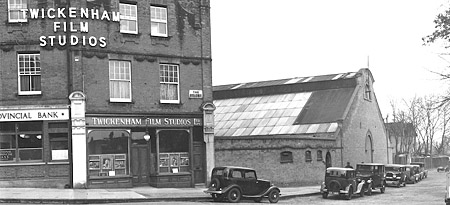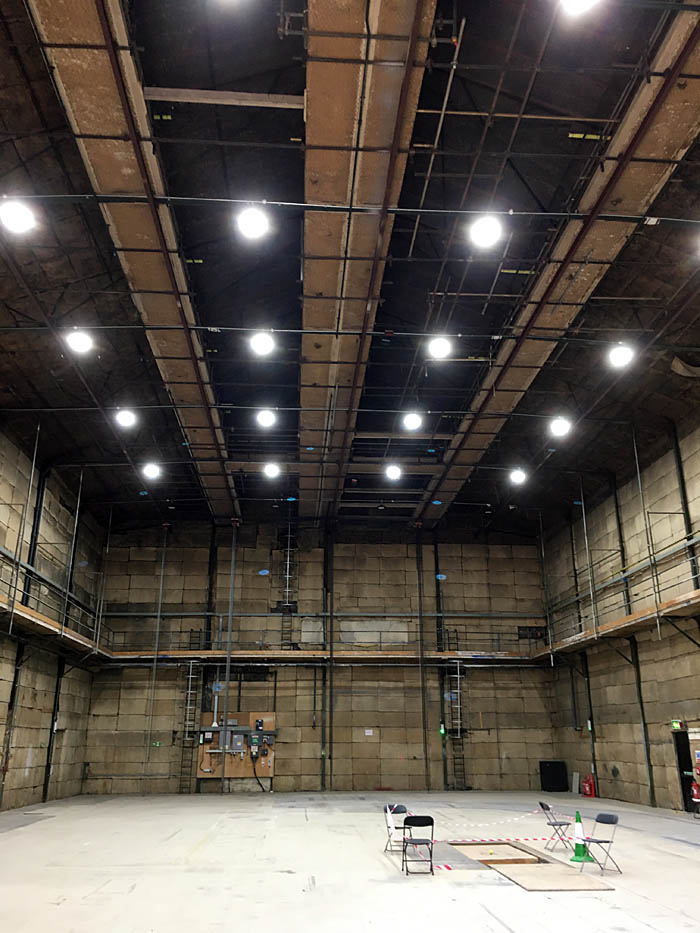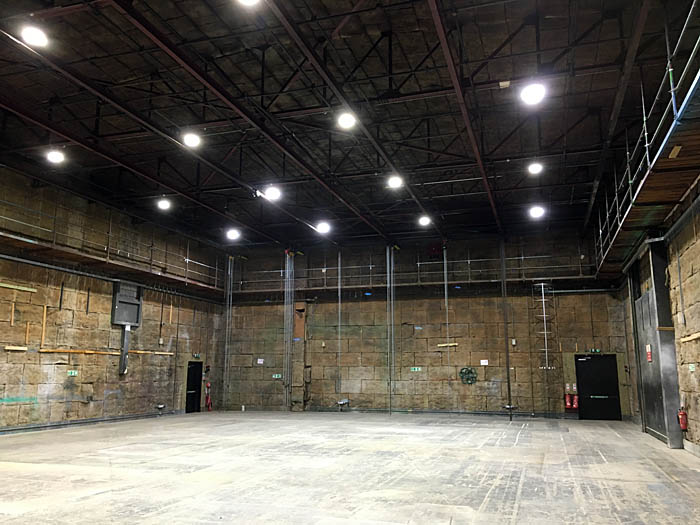1912 – present
(revised April 2025)

Dr Ralph Jupp owned a chain of cinemas during the 1900s which in later years were bought up by Gaumont-British. Flushed with the success of this enterprise, in 1912 he acquired a skating rink (constructed in 1909) and associated buildings in St. Margaret’s, near Twickenham. He turned the rink into what was at the time the biggest shooting stage in the UK (165 x 75ft) with the intention of filming movies to be shown in his cinemas. He called the site ‘St Margaret’s Studios.’ His first feature – The House of Temperley – was released in 1913. He had an eye for the American market too so sent someone across to Hollywood to invite producers, directors and actors to come to his new studio.
Everything went swimmingly for the first couple of years until in 1914 two of his key employees – John East and Percy Nash – set up their own ‘Neptune’ studio in the countryside near Elstree village in north London. These were the studios that eventually became BBC Elstree Centre. Twickenham suffered heavy losses in 1915-16. Jupp’s health suffered and the running of the studios was handed over to his cousin.
The Ideal Company then leased the one stage and made several reasonably successful pictures here with some of the top actors of the day. In 1920, a few months before he died, Jupp sold the studios to the Alliance Company. This company spent £23,000 on new lighting equipment – a lot of cash in those days. Sadly, 2 years later Alliance went bust.


Over the following decades Twickenham changed hands several times. By 1928 the site was owned by Julius Hagen and was renamed ‘Twickenham Film Studios’. A second stage was opened in September 1934 (the present stage 1). This was advertised as being 115 x 61ft but is now stated to be 118 x 64ft on the studio website. Sound equipment was introduced but due to the proximity of the railway line, a look-out had to be posted to warn of approaching trains before each take.
The studios were very busy in the early 1930s – sometimes one film used a stage during the day and another at night! Unfortunately, disaster struck in October 1935 when the main (ice rink) stage was destroyed by fire.
The studio never fully recovered from this and the company went bust again in 1937. During the war they suffered a nearby hit from a bomb which caused damage to several of the buildings.
In 1946 rebuilding work commenced when the studios were acquired by Alliance Film Studios Ltd – who owned Southall, Hammersmith (Riverside) and Twickenham. Probably because much of Twickenham was still damaged, most of their work went to the other two studios.

In the mid to late 1950s the studios mostly made commercials, half-hour shorts and filmed television dramas – see the advert below. A new stage was opened in 1955 – the current stage 3 (93 x 60ft).

thanks to Anthony McKay for bringing this gem to my attention.
Things changed when Guido Coen took over as head of the studios in 1959. He added the present stage 2 (50 x 40ft) and began to attract a new form of film making. Several of the ‘kitchen sink’ gritty dramas such as Alfie and Saturday Night and Sunday Morning were made here.
Most notably, Twickenham became The Beatles’ favourite film studio with A Hard Day’s Night and Help! filmed on Stage 1. The same stage was the location for the filmed rehearsals for a planned concert early in 1969. The concert never happened but some of the songs written and rehearsed here went on to feature on the album Let It Be. Michael Lindsay-Hogg was the documentary’s director and many hours were filmed. These were subsequently edited down to become the film Let It Be. Then in 2020, Peter Jackson revisited the rushes and created a 3-part series called Get Back. The restored footage ran to about 8 hours and is truly a fascinating revelation of The Beatles at work through many tough days but some good ones too. The show was released on Disney+ in November 2021. The Twickenham stage features throughout the first episode and it looks much as it did in 2020, when I visited the studios. Oh, what stories those walls could tell!

In the 1980s investment was made in new world-class sound post production facilities and many famous features were partly or wholly shot on the stages including Reds, Shirley Valentine, The French Lieutenant’s Woman, An American Werewolf in London and A Fish Called Wanda whilst others such as Blade Runner, Cry Freedom, Ghandi and Superman used the excellent post production facilities.
Many TV dramas and features used the studios throughout the 1990s and into the new millennium. Tragically two of the key personnel who were running the studios died in very different circumstances in 2005 and 2006 and left Twickenham rudderless for a few years. By the beginning of 2012 it looked as though they would very likely be closed and redeveloped.
A vociferous and enthusiastic campaign to save the studios was run by Maria Walker. Many well-known actors and directors gave their support. For several months it looked very likely indeed that the studios had sadly been lost but suddenly success came in August 2012 when Twickenham was bought by Sunny Vohra. He invested heavily in the studios over the following few years. There was also a name change simply to Twickenham Studios – possibly reflecting the importance of TV work done here. Nice to hear a happy end to a story like this.

photo by Martin Kempton

photo by Martin Kempton
Twickenham currently has three stages:
stage 1 – 118 x 64ft (7,550 sq ft) – includes a small tank
stage 2 – 50 x 40ft (2,000 sq ft)
stage 3 – 93 x 60ft (5,550 sq ft) – equipped for Virtual Production in 2025
NB – stages 2 and 3 are linked by a 15 x 12ft door. This can be very useful as work on building or dressing a set can continue whilst shooting is continuing on the other stage. The door can then be opened to allow equipment to move from one stage to the other.
Although Twickenham’s stages are not the largest, its post production facilities are amongst the best in the world. There are 3 superbly equipped dubbing theatres and an ADR/Foley theatre here as well as 40 editing rooms and several 4K grading suites. Many award winning features and TV dramas have had their post production carried out at Twickenham. Recent titles have included Bohemian Rhapsody and 1917.
Movies that have filmed scenes on the stages at Twickenham in relatively recent years include The Duchess (’08), An Education (’09), My Week With Marilyn (’11), War Horse (’11), The Iron Lady (’11), Before I Go To Sleep (’14), Frankenstein (’14), Bastille Day (’15) but many more well known features have been dubbed and/or mixed here.
TV work includes: Poirot, The Saint, Mother Love, Children of the North, Lipstick On Your Collar, Cold Comfort Farm, Against All Odds, Cats’ Eyes, Murder Most Horrid, Our Friends in the North, Deacon Brodie, Talking Heads, Microsoap, Spaced, Dirty Work, Man and Boy, Down To Earth, Tipping the Velvet, The Commander, The Kindness of Strangers, Horrible Histories, Sketchy, Primeval, The Hairy Bikers, Morgana, Horrid Henry, Him and Her, A Young Doctor’s Notebook, Mr Sloane, Cuban Fury, Some Girls, Inside Number 9, Crims, Psychobitches, The Kennedys, The Durrells and Blithe Spirit. In 2015 Twickenham hosted its first multi-camera TV gameshow – Tipping Point. Ten Percent – the English version of Call My Agent (the highly acclaimed French comedy drama) – was filmed here in 2021. They also used the local facilities for all the post production work.
In June 2018 it was announced that the management of these studios would also be marketing the new studios being constructed at the Littlewoods Pools building in Liverpool. Two large stages are being built there, enabling a lot more flexibility in what Twickenham can offer potential clients. However, my understanding is that they are no longer linked with that project.
Another interesting development came in March 2020. According to press reports, The Creative District Company (TCDC) and subsidiary operating company TIME+SPACE Studios – led by Piers Read and Jeremy Rainbird – had acquired Twickenham Studios and the Littlewoods Studios mentioned above. (Sunny Vohra, who bought the studios eight years previously and saved them from demolition, was to stay on as co-owner and chairman.)
They were apparently planning to spend £15m carrying out significant improvements over the next months and years. A planning application was submitted in January 2021. Permission was granted the following November. The proposals included constructing a new building at the front of the site which would be open to the public. This would replace the original one which was demolished some years ago. They were hoping to make the studios attractive to local visitors and the new development was to include a bar, restaurant and cinema. This was planned to tie in with using stage 3 as a TV studio, so audiences would be well looked-after when they came to see a show being recorded. This was quite an innovation – studio audiences are often treated pretty poorly to be honest!
In June 2020, Twickenham announced the availability of a ‘brand new TV studio facility.’ This was a short term offer that would use an OB truck provided by NEP for facilities. As part of the refurbishment of the whole site, stage 3 was planned to have many improvements carried out to it, enabling it to be used for ‘shiny floor’ shows.
I was shown round the studios in July 2020 and was informed that the proposed improvements included a resin TV floor and a suite of galleries on the ground floor of the adjoining block, a very short walk across an open passageway, which would be roofed over. I was told that the Twickenham management were looking to find a niche in the studio market that they could fill, rather than competing directly with any other particular studios. Very experienced studio manager (ex TLS) Edward Harvey was brought on board to plan the investment required to enable the old film stage to operate effectively as a multicamera TV studio. Unfortunately, after a few months he left the business – the plan to convert the stage into a TV studio had been dropped. Edward is now very successfully running Versa Studios in Manchester.
The proposed ambitious redevelopment also appears to have been abandoned. According to the official public record The Gazette, TIME+SPACE Studios went into voluntary liquidation in September 2022. They had drawn up the expansion scheme in partnership with the developer, General Projects.
Interestingly, the TIME+SPACE Studios website is active again in 2025 and Piers Reid (but not Jeremy Rainbird) is now associated with Digbeth Loc Studios in Birmingham.
In March 2023 the announcement came that US-European media fund APX Group had acquired a 50% stake of Twickenham Film Studios. They said they planned to use the studio name to rebrand their global studio network. This places the studios on a more secure financial basis for the coming years.
An announcement was made in April 2025 that seems to be a very good idea. Stage 3 (5,550 sq ft) is being converted to house virtual production by installing a 24 x 4.5m LED wall. The studios have formed a partnership with Samsung and virtual production outfit Quite Brilliant on the development, which hopes to be completed by the end of June 2025. It is Samsung’s first major virtual production install in the UK, and third globally. (They will also be setting up offices at the studios). In addition to the 24 x 4.5m back wall, there will be a 105 sq m LED ceiling plus LED mobile totem walls along with a permanent turntable and motion control crane. The wall will use Samsung’s IVC 2.1 pixel pitch technology and Arri colour calibration management system.
This is an excellent use of this sound stage, built in 1955, which is relatively small compared with more recently constructed facilities. It is however a perfect size for use as a VP stage so I am sure it will attract a great deal of work.

